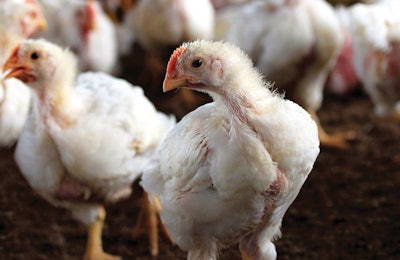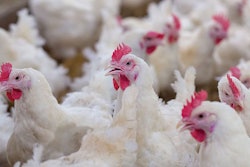
The top broiler companies in the U.S. continued to invest in growth in 2018, but concerns for the state of the market may create a different picture in 2019.
According to WATT Global Media’s annual Top Broiler Companies survey, 27 of the top 29 producers either increased their production or maintained the same level of production as in 2017.
Maintaining the positive momentum of 2017, the majority of the top broiler companies made capital improvements at their facilities or acquired another producer in 2018. According to survey responses and industry research, 19 of the surveyed companies either announced new investments to grow the business or continued work on, or completed, improvements announced in 2017.
However, 2018 closed on a sour note with boneless breast meat prices sagging to a record low. A number of factors like challenging global markets, ever-changing consumer preferences and increased domestic production of competing proteins contributed to this situation. With the wheels already in motion for the industry’s largest players to further increase their output in the near future, 2019 may be a challenging year for the chicken industry.
Industry performance at a glance
In total, the top broiler companies produced 904.14 million pounds of ready-to-cook chicken (RTC) on a weekly basis in 2018, 5.27 million pounds – or about 0.6 percent – more than the 898.87 million pounds produced on a weekly basis in 2017.
Sixteen of the 29 companies saw production rise year-over-year and 11 experienced no change. Comparatively, only two companies decreased output during the year. The decrease was relatively slight, as well. As a whole, those two companies accounted for a decline of only 1.12 million pounds RTC on a weekly basis.
The big five invest in the future
The five largest chicken companies in the U.S. – Tyson Foods Inc., Pilgrim’s Pride Corp., Sanderson Farms Inc., Perdue Foods and Koch Foods Inc. – retained their leading positions in 2018. With the exception of Koch, all increased year-over-year production.
Tyson Foods, the top chicken company, produced 192.34 million pounds of RTC chicken on a weekly basis in 2018, an increase of 17.53 million pounds – or about 10 percent – from 2017.
Tyson significantly widened the gap between its closest competitors in 2018 with a series of moves designed to refocus the animal protein company on its core businesses.
Its largest move was the $2.16 billion acquisition of Keystone Foods LLC from Marfrig Global Foods in August 2018. In 2017, Keystone was ranked as the 10th largest producer in the country with 23.8 million pounds RTC produced on a weekly basis. In addition, it picked up Tecumseh Poultry LLC, also known as MBA Poultry, for an undisclosed amount in June 2018.
Tyson also purchased the poultry rendering and blending assets of American Proteins, and AMPRO Products for $850 million in May 2018. The deal allowed Tyson Foods to recycle more animal products for feed, pet food and aquaculture as well as expand its presence in the growing animal feed ingredient business.
Pilgrim’s Pride, the second-largest company, produced 156.02 million pounds of RTC chicken on a weekly basis in 2018, an increase of 1.82 million pounds – or about 1.2 percent – from 2017.
In February 2018, CEO Bill Lovette said the company had completed its previously announced capital improvements, including projects in Sanford, North Carolina, and in Moorefield, West Virginia. He said the Sanford conversion from commodity to organic tray-pack, and the acquisition of GNP Co. in 2017, brought the company leadership in premium-branded and no-antibiotics-ever (NAE) chickens.
Sanderson Farms, the third-largest company, produced 86.6 million pounds of RTC chicken on a weekly basis in 2018, an increase of 4.1 million pounds – or about 5 percent – from 2017.
In 2018, Sanderson continued construction of a new complex near Tyler, Texas. The $225 million project will include a new feed mill, hatchery, poultry processing plant and wastewater treatment facility. Operations are expected to begin in the first quarter of 2019. The company said its new complex will be able to process approximately 375 million pounds of dressed poultry meat annually.
In December 2018, the company’s CEO Joe Sanderson Jr. said he is not expecting Sanderson to begin working on another new plant in 2019. The company opened new processing facilities in 2015 and in 2017.
Perdue Foods, the fourth-largest company, produced an estimated 64.42 million pounds of RTC chicken on a weekly basis in 2018, an increase of 1.56 million pounds – or about 2.5 percent – from 2017.
In February 2018, Perdue installed a controlled atmosphere stunning (CAS) system at its plant in Milford, Delaware. The company’s plans call for a gradual conversion of the rest of its plants to CAS, with the next installation planned for 2019. The CAS system was the first phase of a more than $15 million project to change live bird handling at the Milford facility.
In April 2018, it announced plans to invest $42 million in expanding its cooking operation in Perry, Georgia. In September 2018, it opened a new, $5 million distribution center in Rincon, Georgia, to support its NAE and organic poultry products.
Koch Foods, the fifth-largest company, produced 50 million pounds of RTC chicken on a weekly basis in 2018, the same amount as 2017.
In January 2018, the company announced the renovation of its hatchery in Henagar, Alabama. In August 2018, it was reported that the company was making $80 million worth of improvements at its poultry processing plant in Gadsden, Alabama.
In 2017, Koch announced a pair of expansion plans for its operations in Alabama. It planned on building a $40.5 million feed mill in Roanoke, Alabama, and expanding its hatchery in Crossville, Alabama. The hatchery expansion was expected to be completed by June 2018.
Other producers making facility improvements
Mountaire Farms Inc.: In 2018, the company planned on building a new, $44 million feed mill in Scotland County, North Carolina. In April 2018, Mountaire announced it was working on a more than $35 million, new wastewater treatment facility.
Wayne Farms LLC: In December 2017, the company announced a $105 million expansion of its plant in Enterprise, Alabama. Work was expected to be completed in early 2019. In March 2018, Wayne Farms opened new, $4.5 million facility in Decatur, Alabama, it calls the Customer Innovation Center. The operation’s mission is product creation, design and testing. In June 2018, it was reported that Wayne was planning a company-wide overhaul of its 10 hatcheries. The first hatchery of the renovation campaign in Decatur, Alabama, was expected to complete its improvements by September 2018.
Peco Foods Inc.: Peco Foods acquired a cold storage facility in West Point, Mississippi, formerly owned by AmeriCold. It is reportedly investing $40 million in the project.
House of Raeford Farms Inc.: In 2018, House of Raeford rebuilt a plant in Teachey, North Carolina, that was previously totally destroyed by a fire.
George’s Inc.: In October 2018, George’s acquired Ozark Mountain Poultry Inc. (OMP). OMP was ranked by WATT Global Media as the 21st largest broiler company in 2018.
Case Foods Inc.: It was reported that Case Farms was planning a $49 million expansion project in Dudley, North Carolina, that will include a new wastewater treatment facility and an expansion of a cold storage facility.
Fieldale Farms: In December 2017, it was reported that Fieldale was planning on expanding its Murrayville, Georgia, poultry processing plant. According to the company, Fieldale completed installation of automatic deboning equipment at both of its slaughter plants in 2018.
Simmons Foods Inc.: In 2017, Simmons announced plans to build a new chicken facility in Benton County, Arkansas. The planned $300 million plant will produce as much as 850 million pounds of poultry meat annually. It is projected to open in 2019.
Claxton Poultry Farms: In 2018, the company installed two new mechanical deboners for a total of four. In 2019, it plans on building a new, $14 million deboning facility in Sylvania, Georgia.
Allen Harim Foods: In 2017, Allen Harim broke ground on a new, $22 million hatchery in Dagsboro, Delaware. That project is expected to be completed in 2019. In August 2018, the company opened a new corporate headquarters near Millsboro, Delaware. It plans on adding a deboning operation to the same building.
Harrison Poultry Inc.: In 2018, Harrison Poultry added $1 million worth of new scalders; completed a $2 million cafeteria renovation; and added a $1.5 million automated breast deboner with X-ray capabilities. In 2019, it plans on adding a new feed mill and truckshop. In December 2018, it broke ground on a $72 million facility including a new feed mill and hatchery in Crawfordsville, Georgia. The new operations are expected to open in 2020.
Farmers Pride Inc.: In 2017, Farmers Pride broke ground on a new processing plant in Pennsylvania that should be operating in 2020.
Miller Poultry: In 2018, the company said it carried out water treatment improvements and live production upgrades for broiler houses. In 2019, it said it’s planning sustainable improvements for live production, expansion of its offices and breakroom and expansion of its crusting tunnel. In January 2018, Miller announced it was renovating its broiler hatchery in Goshen, Indiana.
Hain Pure Protein Corp.: In 2018, the company added automated breast deboning and automated leg deboning. In 2019, it plans on making improvements to its chiller and automated leg deboner systems.


















